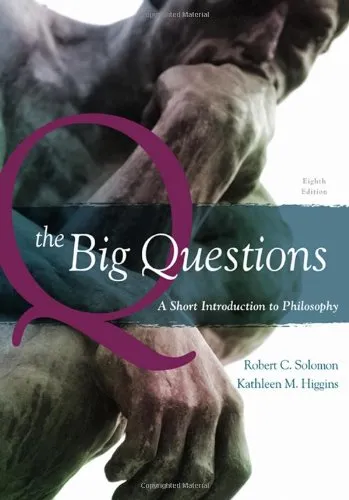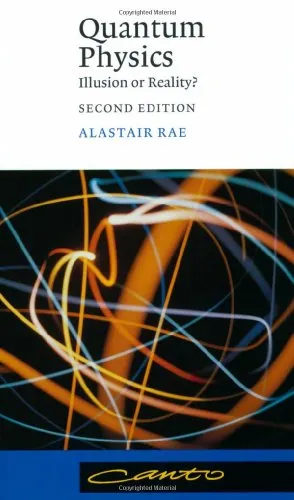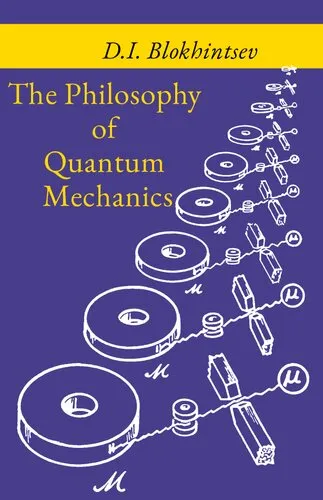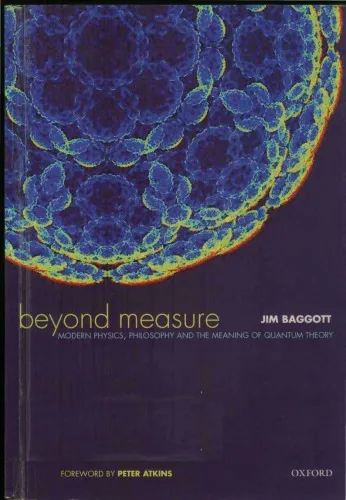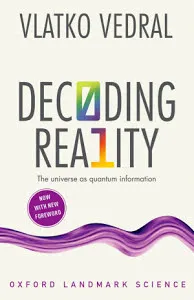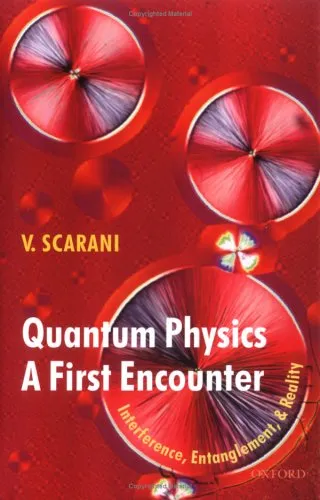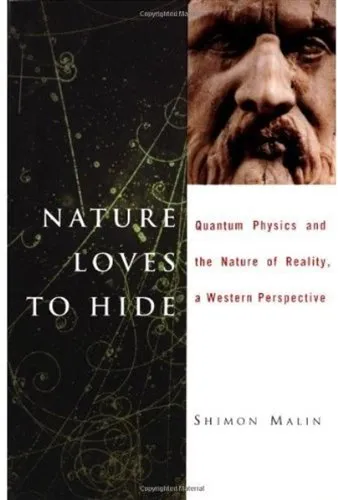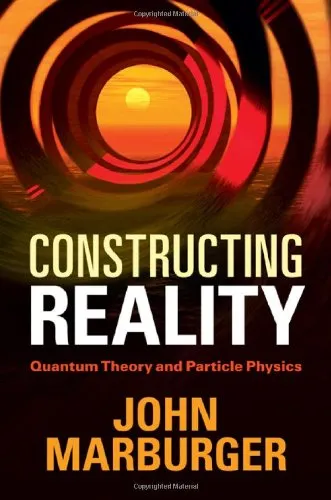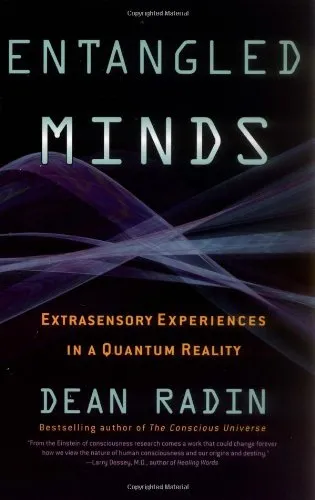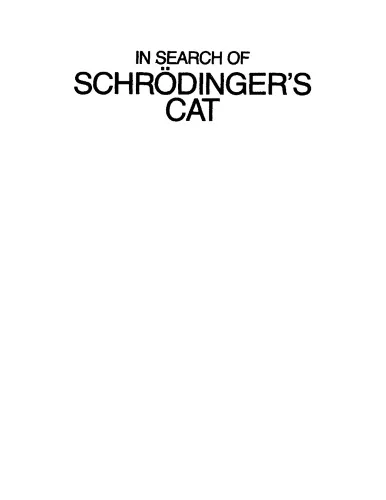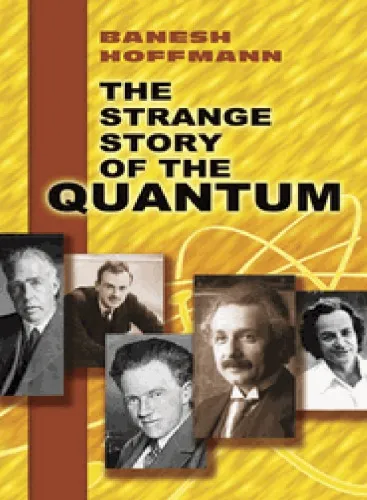Reality and the Physicist: Knowledge, Duration and the Quantum World
4.0
بر اساس نظر کاربران

شما میتونید سوالاتتون در باره کتاب رو از هوش مصنوعیش بعد از ورود بپرسید
هر دانلود یا پرسش از هوش مصنوعی 2 امتیاز لازم دارد، برای بدست آوردن امتیاز رایگان، به صفحه ی راهنمای امتیازات سر بزنید و یک سری کار ارزشمند انجام بدینکتاب های مرتبط:
معرفی کتاب "Reality and the Physicist: Knowledge, Duration and the Quantum World"
کتاب "Reality and the Physicist: Knowledge, Duration and the Quantum World" نوشته دکتر برنارد دِسپانیا، فیلسوف و فیزیکدان برجسته، به بررسی یکی از پیچیدهترین و جذابترین مباحث تاریخ علم و فلسفه میپردازد: آیا ما میتوانیم واقعیت نهایی جهان را درک کنیم؟ این کتاب با ترکیب تئوریهای مدرن علم فیزیک به خصوص مکانیک کوانتومی، و تحلیلهای فلسفی عمیق، خوانندگان را به سفری در دنیای علم و معرفتشناسی میبرد.
خلاصهی جامع از کتاب
در این کتاب، دسپانیا سوال بنیادینی را مطرح میکند که آیا واقعیت مستقل از ذهن ما وجود دارد یا اینکه مشاهده و آگاهی ما نقش بنیادی در شکلگیری آن ایفا میکند. او با تحلیل ایدهآلهای نیوتنی و جبرگرایانه درباره طبیعت و تضاد آنها با نتایج عجیب مکانیک کوانتومی، این مفهوم را که "واقعیت چیزی است که ما مشاهده میکنیم" به چالش میکشد.
کتاب از چندین بخش اصلی تشکیل شده که هر کدام به بررسی ابعادی از واقعیت میپردازند. یکی از محورهای اصلی کتاب، مفهوم "non-separability" در مکانیک کوانتومی است. دسپانیا توضیح میدهد چگونه این اصل، ایده کلاسیکی تفکیکپذیری و استقلال اشیای فیزیکی از یکدیگر را نقض میکند. او همچنین به موضوع زمان، ماندگاری (Duration) و پارادوکسهای مربوط به آنها در جهان کوانتومی میپردازد.
دسپانیا بر این باور است که فیزیک مدرن تصویر کاملا عینی و مستقلی از واقعیت جهان ارائه نمیدهد، بلکه این تصویر متأثر از تعامل ما با جهان و دادههای مشاهدهای ما است.
برداشتهای کلیدی از کتاب
- مکانیک کوانتومی به ما نشان میدهد که مشاهدهگر نمیتواند از مشاهدهشده جدا باشد؛ رابطهای بنیادی بین این دو وجود دارد.
- "non-separability" یا "غیرتفکیکپذیری" یکی از برجستهترین مفاهیمی است که ساختار کلاسیکی واقعیت را از نو تعریف میکند.
- فیزیک مدرن، به خصوص مکانیک کوانتومی، نشان میدهد که شناخت انسانی از واقعیت محدود به مدلها و توضیحات ذهنی است، نه واقعیت مستقل.
- زمان و ماندگاری از نگاه مکانیک کوانتومی ممکن است بر مبنای تصورات انسانی و محدودیتهای مشاهدهای دوباره تفسیر شوند.
- فلسفه و علم دست در دست هم میتوانند درک انسان را از مفاهیم عمیق چون واقعیت گسترش دهند.
نقلقولهای معروف از کتاب
"Reality is not what it seems; it is shaped by our understanding and thus always incomplete."
"In quantum mechanics, the observer and the observed are one; this intertwining is a crucial aspect of our reality."
چرا این کتاب اهمیت دارد؟
کتاب "Reality and the Physicist" یکی از آثار کلیدی در زمینه اندیشه فلسفی علمی است که مخاطب را تشویق به زیر سوال بردن مفاهیم پذیرفتهشده درباره واقعیت میکند. در عصر کنونی که علم به تدریج مرزهای ناشناخته را فتح میکند، دسپانیا یادآوری میکند که علم، تنها پاسخی نهایی برای همه سوالات نیست؛ بلکه ابزاری است که همراه با فلسفه به ما فرصتی برای جستجوی عمیقتر میدهد. این کتاب نقطهی تلاقی بینظیری است بین مکانیک کوانتومی، فلسفه و ادراک انسانی، که آن را برای دانشجویان، پژوهشگران و هر فرد علاقهمند به علم و فلسفه به منبعی بیبدیل تبدیل میکند.
Introduction
Welcome to the fascinating journey into the nature of reality as explored in my book, "Reality and the Physicist: Knowledge, Duration and the Quantum World". This work delves into some of the most profound and enduring questions about existence, knowledge, and the quantum underpinnings of the universe. Written with the intention of bridging the gap between physics and philosophy, the book invites readers to explore the relationship between human perception and the deeper realities suggested by contemporary science.
In the modern world, where quantum mechanics has overturned classical notions of reality, the question of "what is real?" becomes more elusive than ever. Science, with its ability to reveal patterns and connections, interacts with philosophical inquiry to illuminate concepts like knowledge, time, and the structure of the universe. This book reexamines age-old metaphysical concepts in light of breakthroughs in quantum theory, encouraging readers to confront the enigmatic nature of existence itself.
Detailed Summary of the Book
"Reality and the Physicist" is rooted in deep philosophical curiosity fueled by the implications of modern physics. The book begins by establishing the historical backdrop, transitioning from classical physics’ deterministic framework to the probabilistic and non-intuitive findings of quantum mechanics. Through this foundation, I address the cultural and intellectual shifts wrought by quantum theory, particularly as it challenges traditional notions of objectivity and determinism.
The heart of the text revolves around the philosophical implications of quantum mechanics—specifically the "measurement problem" and whether reality exists independently of the observer. Drawing inspiration from scientific luminaries like Niels Bohr and Werner Heisenberg, I explore ideas such as complementarity and indeterminacy, emphasizing that our scientific descriptions of the world often reveal "empirical reality" rather than "ultimate reality."
chapters also probe into the nature of time. I explore Henri Bergson’s philosophy of "duration" to question whether time is a physical property or a deeply subjective construct. By juxtaposing these ideas with findings from quantum mechanics, the book engages readers in understanding time as both an experiential and metaphysical phenomenon.
Ultimately, "Reality and the Physicist" leaves many questions open-ended, advocating for intellectual humility in addressing the mysteries of existence. It acknowledges that while science provides a powerful framework for understanding the world, it remains incomplete for addressing the full spectrum of metaphysical inquiry.
Key Takeaways
- The findings of quantum mechanics challenge our classical, intuitive understanding of reality, forcing us to rethink objectivity, causality, and determinism.
- Reality can no longer be confined to what is directly measurable or observable; science points to layers of reality that may remain hidden from human perception.
- Time is more than a simple dimension of physics—it is a complex phenomenon tied to human experience and possibly to the deeper structure of the universe.
- Scientific knowledge is not absolute but is instead closer to an empirical approximation of deeper, more fundamental truths.
Famous Quotes from the Book
"Science does not tell us what reality is; it tells us only what reality seems like to us."
"The quantum world forces us to accept that the act of observation may create, rather than discover, reality."
Why This Book Matters
"Reality and the Physicist" stands at the crossroads of physics and philosophy, making it a work of immense importance for anyone seeking to understand the deeper implications of modern science. By questioning the fundamental nature of reality, the book pushes readers to interrogate the limits of knowledge itself. Scientists, philosophers, and curious minds alike will find this text a thought-provoking exploration of ideas that transcend disciplinary boundaries and speak to the core of human inquiry.
This book matters because it leaves us humbled as seekers of truth. No matter how advanced our mathematical and experimental prowess becomes, the ultimate nature of reality—whether it be timeless, formless, or even beyond human comprehension—remains shrouded in mystery. As I argue in its pages, this sense of mystery is not a defect of science but rather one of its greatest gifts. It reminds us of the deep, unsolvable beauty of the universe.
دانلود رایگان مستقیم
شما میتونید سوالاتتون در باره کتاب رو از هوش مصنوعیش بعد از ورود بپرسید
دسترسی به کتابها از طریق پلتفرمهای قانونی و کتابخانههای عمومی نه تنها از حقوق نویسندگان و ناشران حمایت میکند، بلکه به پایداری فرهنگ کتابخوانی نیز کمک میرساند. پیش از دانلود، لحظهای به بررسی این گزینهها فکر کنید.
این کتاب رو در پلتفرم های دیگه ببینید
WorldCat به شما کمک میکنه تا کتاب ها رو در کتابخانه های سراسر دنیا پیدا کنید
امتیازها، نظرات تخصصی و صحبت ها درباره کتاب را در Goodreads ببینید
کتابهای کمیاب یا دست دوم را در AbeBooks پیدا کنید و بخرید
1255
بازدید4.0
امتیاز0
نظر98%
رضایتنظرات:
4.0
بر اساس 0 نظر کاربران
Questions & Answers
Ask questions about this book or help others by answering
No questions yet. Be the first to ask!


